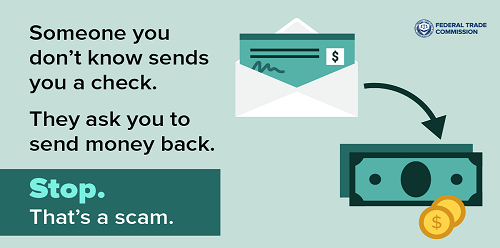Social Media Fake Check Scam
Did you get a message on social from an “artist” asking to pay you for permission to paint your photo? It’s a scam. They don’t want to pay you — they want to take your money.
People report this scam begins with a direct message on social media from someone who says they like your photo and want to pay you thousands of dollars to use it. Next, they’ll send you a check. They’ll tell you to deposit it, take some money out to send to the artist for supplies, and keep the rest. They may promise to reimburse any money you send back. (But they never will because it's a scam.)
While the check may look real and the funds may initially show up in your bank account, the check’s fake. By the time the bank realizes it, you’ll be out the money you sent the scammer and owe the bank any money you withdrew.
How do you spot this scam? Here’s the takeaway: If someone you don’t know sends you a check and asks you to send money back to them or to someone else, it’s a scam. It’s best to only deposit checks from people you know and trust.
Learn more about how to spot, avoid, and report scams—and how to recover money if you’ve paid a scammer—at ftc.gov/scams. If you spot a scam, report it to the FTC at ReportFraud.ftc.gov.
Source: consumer.ftc.gov
NE PA Credit Union cares about its members and serves to be a resource for you. If you think you are being scammed, please do not hesitate to call us. We have a Risk and Compliance Specialist available to provide guidance to our members who may have experienced fraud or suspect fraud on their credit union account. Members can call 570-421-5585, ext. 1178, during regular business hours.
